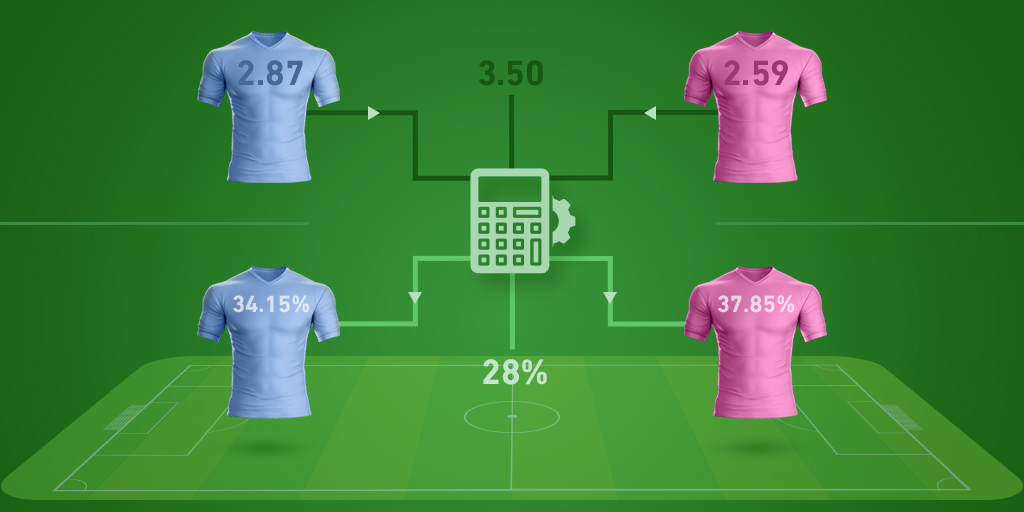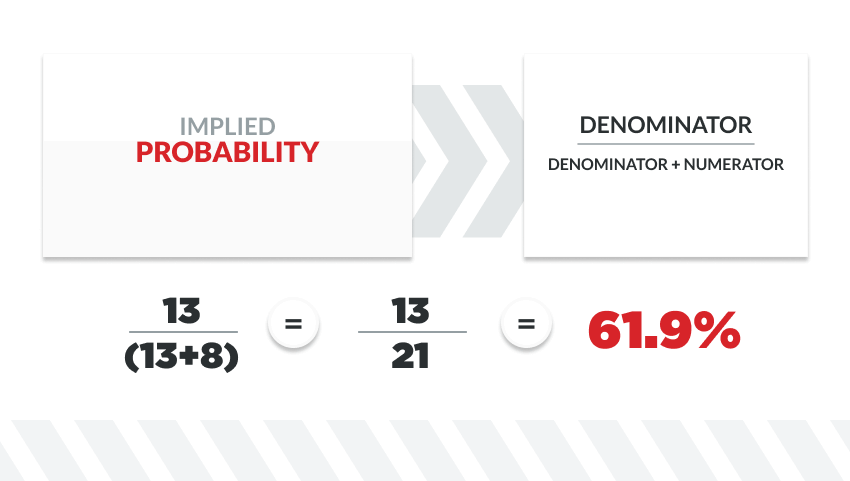Betting odds for the NFL are formed for several aspects of the league. They are based on outcomes for games, the season, and more. Oddsmakers research and install betting lines for a variety of outcomes relating to the season. A bettor can then search to see what they would like to. Betting Odds Explained. As the section above explains, odds can be displayed in three different formats, but they all convey the same information. This can be confusing and often warrants the question, “how do betting lines work?” This is probably the easiest part of it all. When betting on politics (or anything, for that matter), you have to understand the concept of underdogs and favorites. The oddsmaker spends days, weeks, months even, looking at the statistics and calculating the odds. If you are absolutely sure that the favorite will win, it makes sense to bet on them even if the payout is meager.
Welcome to the Sports Betting Odds section of The Sports Geek. If you are new to sports betting and don’t understand how to read betting odds (+150, -110, +2200, etc) we will lay it all out for you and help you learn how the betting odds work.
Betting Site | Bonus | Bet Now | |
|---|---|---|---|
| 1 | up to €30 Free Bet | Go to Site | |
| 2 | 22Bet | 100% up to €122 | Go to Site |
| 3 | 100% up to €200 | Go to Site | |
| 4 | 10Bet | 100% up to €50 | Go to Site |
| 5 | 100% up to €50 | Go to Site |
Sports Betting Odds Explained
Many people don’t know how to read or calculate sports betting odds, so below we have done our best on explaining how betting odds work. The most common type of sports betting odds used in North America are the American style odds which we explain below.
American Style Sports Betting Odds
Most online sportsbooks will list their odds in what is called “American Odds”. There are a couple different versions of sports betting odds, but these American Odds are the most common odds used. Reading and understanding sports betting odds can bet a little confusing to beginners, so we have provided an example below using two NFL football teams:
American Odds
- Matchup Odds
- New England Patriots +120
- Pittsburgh Steelers -140
The number shown in the bracket represents the odds. The American Odds have two components to them, the first being the positive or negative sign, and the second being the number that follows the sign.
The sign in front of the number indicates whether placing a wager on that outcome will pay out more money then you have wagered or less money then you have wagered. If the odd is negative (-) it means that outcome is more likely to happen and placing a bet on that outcome would payout less than the amount you wagered, while a positive (+) odd shows that the outcome is less likely to happen and it would pay out more than the amount you wagered.
The next step is figuring out exactly how much the bet pays out, which is where the numbers in the odds come into play.

A listed odd with a – sign in front of it, such as the -140 in our example above, shows us how much money you would need to wager in order to win $100. So using the -140, this would show us that you would need to bet $140 in order to win $100 in profits. You can easily substitute the $100 bet for a $10 bet by moving the decimal place over one spot, showing us that you would need to wager $14 in order to win $10 in profits.
Examples:

A listed odd with a + sign in front of it, such as the +120 in our example above, shows us how much money you would win on a $100 bet. Using the +120 odds, it shows us that a $100 bet on that outcome would pay out $120 in profits. Again this can easily be converted into smaller or larger size bets. A $10 bet on +120 odds would pay out $12 in profits.
Examples:
Below is an example of NFL betting odds taken from an online betting site.
In this example you can see Los Angeles is listed at +130 ($100 bet pays $130 plus of course your original wager back) and New England is listed at -150 ($150 bet pays $100).
The great thing about betting online is that the online sportsbooks will do the calculations for you before you place your bet. You can click on the outcome or team you would like to bet on, and then input the amount you wish to wager and it will show you your potential pay out before you confirm your bet.
Ready To Start Betting?MyBookie and BetNow are my two favorite sportsbooks and make betting very easy. You will also get a Free Money Bonus at each sportsbook if you follow either link above.
Decimal Style Sports Betting Odds
Decimal style odds are used mostly in Europe, and are pretty easy to understand. To calculate the decimal style odds all you will need to do is simply multiply the amount you wish to wager by the decimal odds shown and you will get your payout. For example it may look something like this:
If you wanted to place a $10 wager on the USA at 2.40 you would simply need to multiply your $10 wager by the 2.40 odds (10 x 2.40) to find out that the payout is $24. It is important to realize that with decimal style odds it includes the amount you wagered, so to find out profits you would need to subtract your wager ($24 – $10) to find out your potential payout is $14 in profits.
If you wanted to place a $10 wager on Brazil you would again just multiply $10 x 1.55 to find out that you would win $15.50 total or $5.50 in profits.
Decimal style betting odds are very simple to understand, but you won’t see them displayed in many North American sportsbooks. With that said, most online betting sites will allow you to chose the style of betting odds you want displayed, with American odds set as the default.
“Wait, why does this NFL team have a -235 next to its name? What’s with New England Patriots (-15) vs. Miami Dolphins (+15)? Help! HEEEELPPPP!”
If that sounds like you, we’re here to assist you. If you’ve stared at a board at a sportsbook or just seen spreads and moneylines on the Internet and been utterly confused, don’t worry. It’s not just you. Those numbers can be confounding.
But hopefully, once you’re done reading this, you’ll completely understand how they work. As you prepare to dive into the world of sports betting, here’s a breakdown of how the lines work, starting with …
Spreads
It would be really easy to bet on a game if you could put money on a heavy favorite to win.
That’s where point spreads come in. Let’s look at an example:
Philadelphia Eagles (-4.5)
:max_bytes(150000):strip_icc()/dotdash_Final_The_Math_Behind_Betting_Odds_and_Gambling_Nov_2020-01-735accb453c8424b9e063c2c14e4edf4.jpg)
New York Giants (+4.5)
In this case, you can bet on either two outcomes: you can put money on the Eagles to win the game by 4.5 points OR MORE, which makes them the favorites. Or you can bet that the Giants will either win or lose by LESS THAN 4.5 points. They’re the underdogs.
Now, sometimes the spread “moves” during the days leading up to the game. Perhaps the Eagles’ spread ends up being -3.5 (in which they must win by 3.5 points or more to give you a victory in your bet). Your bet all depends on whichever spread you bet on, whether it was when the Eagles were favored by 4.5 or 3.5 points.
If you ever see “PK” or “pick” next to a team, it means there’s no spread and you can bet on who will win, no matter what the score is.
Moneylines
Odds Meaning In Sports Betting
Let’s take that same example above but use moneylines:
Philadelphia Eagles (-200)
New York Giants (+150)
The team with a minus symbol is the favorite, and the number is how much money you would need to bet to win $100. In this case, you would have to bet $200 on the Eagles in order to win an additional $100.
The Giants are the underdogs. If they’re +150, that means you could bet $100 to win $150.

Note that you can bet any amount you want, but those numbers are always calculated and posted the same way, either in how much money you would need to wager to win $100 or how much money you could win by wagering $100.
Odds

If you’re betting on something like the team who will win the Super Bowl in the future, you might see it look like this:
New England Patriots — 3/1
Odds Explained In Betting Sites
Baltimore Ravens — 5/1
Kansas City Chiefs — 8/1
If you were betting on the Patriots and their 3/1 odds, you would win $3 for every $1 you spend. So if you bet $50 on the Pats and they ended up winning the Super Bowl, you’d win $150 (plus your original wager) back.
Good luck!